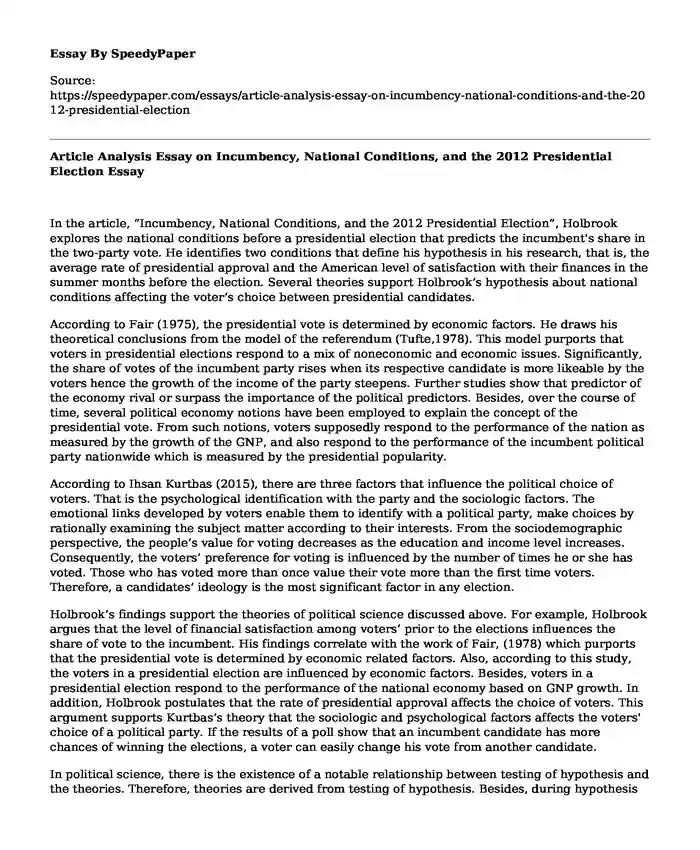
| Type of paper: | Article review |
| Categories: | Politics Political science |
| Pages: | 3 |
| Wordcount: | 649 words |
In the article, “Incumbency, National Conditions, and the 2012 Presidential Election”, Holbrook explores the national conditions before a presidential election that predicts the incumbent's share in the two-party vote. He identifies two conditions that define his hypothesis in his research, that is, the average rate of presidential approval and the American level of satisfaction with their finances in the summer months before the election. Several theories support Holbrook’s hypothesis about national conditions affecting the voter’s choice between presidential candidates.
According to Fair (1975), the presidential vote is determined by economic factors. He draws his theoretical conclusions from the model of the referendum (Tufte,1978). This model purports that voters in presidential elections respond to a mix of noneconomic and economic issues. Significantly, the share of votes of the incumbent party rises when its respective candidate is more likeable by the voters hence the growth of the income of the party steepens. Further studies show that predictor of the economy rival or surpass the importance of the political predictors. Besides, over the course of time, several political economy notions have been employed to explain the concept of the presidential vote. From such notions, voters supposedly respond to the performance of the nation as measured by the growth of the GNP, and also respond to the performance of the incumbent political party nationwide which is measured by the presidential popularity.
According to Ihsan Kurtbas (2015), there are three factors that influence the political choice of voters. That is the psychological identification with the party and the sociologic factors. The emotional links developed by voters enable them to identify with a political party, make choices by rationally examining the subject matter according to their interests. From the sociodemographic perspective, the people’s value for voting decreases as the education and income level increases. Consequently, the voters’ preference for voting is influenced by the number of times he or she has voted. Those who has voted more than once value their vote more than the first time voters. Therefore, a candidates’ ideology is the most significant factor in any election.
Holbrook’s findings support the theories of political science discussed above. For example, Holbrook argues that the level of financial satisfaction among voters’ prior to the elections influences the share of vote to the incumbent. His findings correlate with the work of Fair, (1978) which purports that the presidential vote is determined by economic related factors. Also, according to this study, the voters in a presidential election are influenced by economic factors. Besides, voters in a presidential election respond to the performance of the national economy based on GNP growth. In addition, Holbrook postulates that the rate of presidential approval affects the choice of voters. This argument supports Kurtbas’s theory that the sociologic and psychological factors affects the voters' choice of a political party. If the results of a poll show that an incumbent candidate has more chances of winning the elections, a voter can easily change his vote from another candidate.
In political science, there is the existence of a notable relationship between testing of hypothesis and the theories. Therefore, theories are derived from testing of hypothesis. Besides, during hypothesis testing, inductive logic is employed to draw a relationship between various variables related to the hypothesis. In line with this, during theory development, deductive reasoning is used to generate a model that utilizes evidence and findings collected during hypothesis testing. The theories seek to explain the relationship between variables used during hypothesis testing.
References
Fair, R. C. (1978). The effect of economic events on votes for president: 1984 update. Political Behavior, 10(2), 168-179. https://doi.org/10.1007/bf00991412
Holbrook, T. M. (2012). Incumbency, national conditions, and the 2012 presidential election. PS: Political Science & Politics, 45(04), 640-643. https://doi.org/10.1017/s1049096512000923
Kurtbas, I. (2015). (PDF) The factors influencing voting preferences in local elections " An empirical study ". ResearchGate. https://www.researchgate.net/publication/295095195_The_Factors_Influencing_Voting_Preferences_in_Local_Elections_An_Empirical_Study
Tufte, E. R. (1975). Determinants of the outcomes of midterm congressional elections. American Political Science Review, 69(3), 812-826. https://doi.org/10.2307/1958391
Cite this page
Article Analysis Essay on Incumbency, National Conditions, and the 2012 Presidential Election. (2023, Dec 30). Retrieved from https://speedypaper.net/essays/article-analysis-essay-on-incumbency-national-conditions-and-the-2012-presidential-election
Request Removal
If you are the original author of this essay and no longer wish to have it published on the SpeedyPaper website, please click below to request its removal:
- Literary Essay Sample on the Expansionism Period Authors
- Political Science Essay Example on Anti-imperialism
- Genetics Essay Sample: The Incredible Expanding Adventured of the X
- Saudi Arabia Case Study Example
- Leo Tolstoy's Role as a Peacemaker - Free Essay Example
- Paper Example. Final Project Process Reflection
- Essay Sample on Origin of World War I
Popular categories




